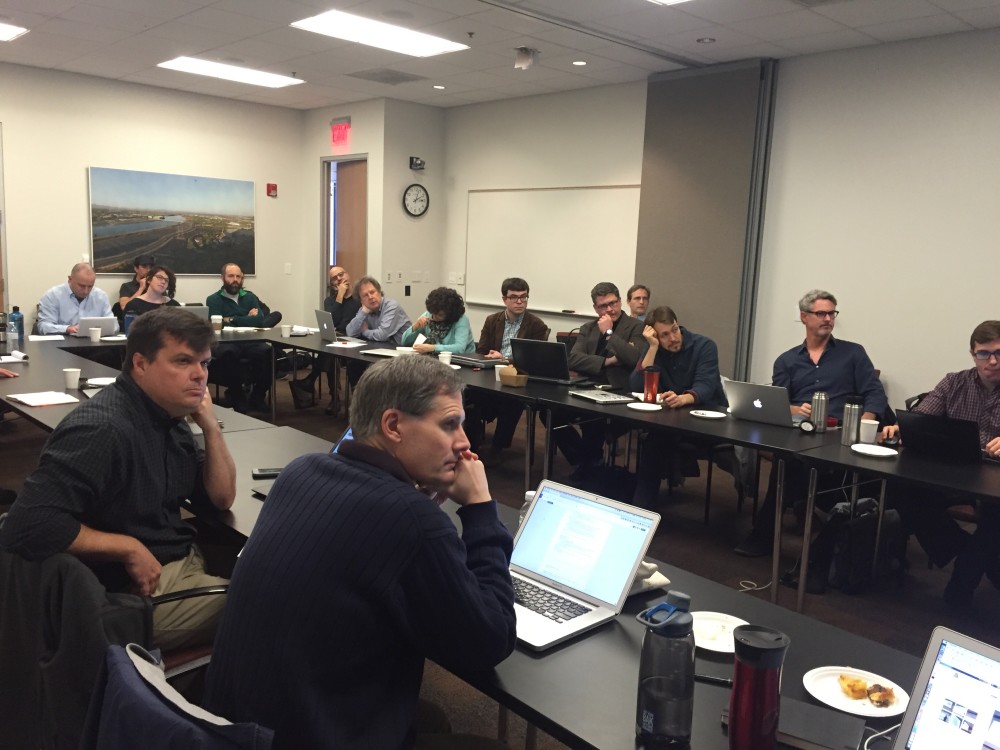HGP and DCDC Workshop 2016: Helping and Resilience in the Face of Disaster
The Human Generosity Project
January 15-16, 2016
The Human Generosity Project team partnered with the Decision Center for a Desert City to host a multidisciplinary workshop in Tempe, Arizona. The workshop served as a platform for discussion on the topic of helping behavior and the enhancement of resilience in the face of environmental uncertainty. Psychologists, anthropologists, engineers, mathematicians, and disaster recovery experts all shared their insights and latest findings in an environment of rich dialog stimulated by a great diversity of perspectives and methodologies.
The workshop began on Friday with presentations by Lee Cronk and Athena Aktipis. These opening talks described the field work and subsequent computational modeling that was inspired by the system of generosity toward those in need practiced by Maasai pastoralists in Kenya and Tanzania, which served as a foundation for the Human Generosity Project. The concept of need-based transfers, or a system of giving based on need that does not require keeping track of the balance of exchanges, was a key component of the discussions.
These talks were followed by Dave White, director of the Decision Center for a Desert City, who described water sustainability issues facing Arizona. He displayed a series of enlightening graphics generated through innovative methods such as satellite technology that measures water’s gravitational pull. This presentation motivated a discussion of sharing within the context of modern policy and resource management. Then, disaster recovery expert Keith Tidball of Cornell University highlighted the potential for need-based transfers to play a key role in a community’s ability to overcome the adversities brought about by disasters. He linked the concept of need-based transfers to a community’s resilience, or its ability to endure and recover from the hardships brought about by disasters. He also highlighted important considerations such as the distinction between charity and mutual aid.
The workshop continued to generate stimulating ideas as Daniel Sullivan, a psychologist at the University of Arizona, suggested that cultural variation is a significant component that might affect threat perception. Societies might differ on whether they are guilt or uncertainty oriented, which might have important implications with regards to how different societies respond to disasters. Following Sullivan, Ben Trumble, an anthropologist at the University of Santa Barbara, talked about his work with the Bolivian Tsimane. He described the adversities that the Tsimane community had to face after severe floods inundated many people’s homes and destroyed their possessions. Trumble reported on his interesting findings regarding sharing and helping behavior in the post-disaster context.
In the afternoon, anthropologist Daniel Hruschka of Arizona State University described a series of different methodologies for testing the role of subjective closeness on the likelihood of sharing. He spoke of the norms for sharing in rural Bangladesh and how these norms might differ from sharing norms in the United States. Matthew Gervais of Arizona State University and Rutgers University followed with an analysis of risk management and sharing in his field site in Fiji. He emphasized the role of ceremony in establishing formal exchange relationships and also discussed the practice of kerekere, or exchanges with no expectation of repayment, in relation to the framework of need-based transfers and disaster resilience. Then, Tom Conte, an anthropology doctoral student at Rutgers University, continued to provide valuable context to the applicability of need-based transfer systems to real disaster scenarios by describing his field site in Mongolia. He discussed how Mongolian pastoralists rely heavily on help from neighbors to prepare for severe winter storms called dzud.
Dieter Armbruster, a mathematician at Arizona State University, reignited the discussion on modeling need-based transfers by talking about his latest work that explored the role of spatial and temporal heterogeneity in need-based transfers. Michael Clough, an engineering doctoral student at Arizona State University, gave the last presentation on Friday. He stimulated thought about the applicability of need-based transfers in the modern business world by describing the need-based system of seat exchange among airlines.
On Saturday, the day began with an interesting presentation about how need-based transfers might have been employed by earlier civilizations. John Murphy, a computational social scientist at Argonne National Laboratory, raised the possibility that people of the ancient Hohokam culture that inhabited Arizona might have relied on need-based transfers of labor in order to build complex irrigation systems. Then, Marco Campenni, a postdoctoral researcher in the Aktipis lab, presented his latest agent-based modeling results as well as his plans for future modeling of need-based transfers within heterogeneous environments. Next, Hugh McDonald discussed the ongoing involvement of the Human Generosity Project with the Exploratorium Museum in San Francisco. He talked about the several benefits of giving people the opportunity to participate in interactive science exhibits that are designed with the assistance of scientists and led a conversation about potential new exhibits.
The remainder of the workshop was devoted to open discussions about the importance of continuing to assess the role of need-based transfers in allowing communities to overcome the adversities following natural disasters. The diversity of methodologies and approaches was recognized to be a strength of the project that would allow for a more comprehensive evaluation of systems and policies that facilitate disaster recovery. The future of the project was considered with enthusiasm as it will continue to explore the systems of exchange that motivate generosity in the face of need.
Participants’ Websites
Athena Aktipis: http://www.athenaaktipis.com/Home.html
Lee Cronk: http://anthro.rutgers.edu/fac/department-undergrad-a-grad-faculty/lee-cronk
Dave White: https://sustainability.asu.edu/person/dave-white/
Keith Tidball: http://dnr.cals.cornell.edu/people/keith-tidball
Daniel Sullivan: http://psychology.arizona.edu/daniel-sullivan
Ben Trumble: https://sites.google.com/site/bentrumble/
Daniel Hruschka: http://hruschka.faculty.asu.edu/
Matthew Gervais: http://www.matthewgervais.net/
Tom Conte: http://evolution.rutgers.edu/people/ches-graduate-affiliates/56-ches-affiliates/modern-humans-students/165-tom-conte
Dieter Armbruster: https://math.la.asu.edu/~dieter/
Michael Clough: https://www.linkedin.com/in/michaelcclough
John Murphy: http://www.ci.anl.gov/profile/267
Marco Campenni: http://www.humangenerosity.org/people/marco-campenni/
Hugh McDonald: http://www.exploratorium.edu/about/staff/scientists/hugh-mcdonald
SHARE THIS PAGE:

